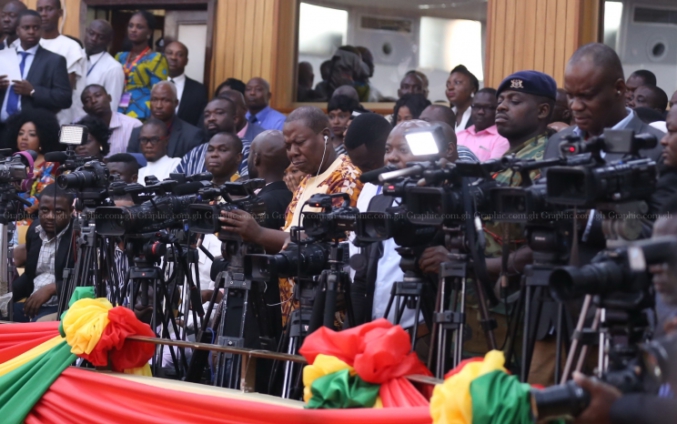The Director General of the Ghana Broadcasting Corporation (GBC), Professor Amin Alhassan, is calling for a national dialogue to find viable solutions to the issue of underpayment of journalists in the country.
According to him, this will help journalists have the honour to serve the country’s democracy and also hold duty bearers accountable.
He expressed that journalists in the country cannot be expected to be instrumental in ensuring that a positive change is achieved when they are underpaid.
“You can’t be paying journalists with the power to speak over a microphone 500 cedis a month and expect them to be instrumental in ensuring that our public sphere is effective for critical public discussions over serious policy issues.”
“We must have a national conversation to see how the private media, the community media, the public media are sustainable financially to ensure that their workers are properly paid so that they can have the honour to serve our democracy,” he said on JoyNews’ Newsfile on Saturday April 22.
Prof. Alhassan expressed that the current low financial muscle of the media in Ghana makes it easily possible for journalists to be influenced by officials.
Meanwhile, Prof Alhassan has lamented the dwindling revenue generation by the traditional media compared to that of social media or online media.
According to him, although the traditional media generate much of the content used by online media, it does not rake in as much revenue as those other avenues.
He noted that despite the country pursuing digital transformation in virtually every sector of the economy, the larger section of Ghana’s population still depend on the traditional media and therefore measures need to be taken in sustaining it financially.
His comments come after a publication, The State of the Ghanaian Media Report 2023 said the Ghanaian media is not financially viable.
According to the report, “the media industry is too heavily plagued by saturation, the cost of doing business in Ghana, dwindling advertising budgets [including capital fight onto social media platforms], the after-effects of the COVID-19 pandemic and fast-evolving technological changes to be considered financially healthy.”
It noted that the financial health of the local media is patchy, at best.
It added that although there are clear signs of healthy indicators of financial potential, there are equally pressing challenges to viability.
“Factors situated within the structure of the local media scene, the COVID-19 pandemic, the state of the local economy and the fast pace of technological evolutions both hurt the financial health of the media in Ghana.
“Like all businesses in the country, media organisations are finding themselves at the mercy of forex rate-induced rising fuel, utility and retooling costs which have become a constant drain on incomes. As these and other costs increase, the capacity for media to adequately resource and remunerate employees to engender professional practice reduces.
“The high cost of doing business also has implications for content diversity. Indeed, as we find, it costs more to generate local content than to import and do voice translation sound inserts. This explains the increasing levels of imported Asian and Southern American telenovelas which are gradually weaning local audience tastes off local films and drama. The long-term implications for financial viability are dire,” the report said.
Latest Stories
-
Koforidua Catholic Bishop warns clergy against unfounded prophecies after helicopter crash
3 minutes -
Melcom Group signs book of condolence in honour of 8 fallen patriots
3 minutes -
Why I think Dr Bryan Acheampong is simply the best
12 minutes -
Access Bank, others pay tribute to helicopter crash victims
12 minutes -
I believe NPP will give me mandate to lead – Dr Adutwum
23 minutes -
Observer missions push for EC appointment overhaul, lower presidential age limit
26 minutes -
Fidelity Bank launches ‘Sika Bumm Reloaded’ promo
30 minutes -
‘Let’s Talk’ premieres on JoyPrime with powerful, emotional stories
36 minutes -
Kyei-Mensah-Bonsu calls for insurance cover for all military helicopters
41 minutes -
Quick Service Restaurants are delivering cutting-edge services using digital payments – A Better Way to Pay!
43 minutes -
Enimil Ashon: Vetting prophecy: Na who cause am?
47 minutes -
How Brisk Walking can help control Blood Sugar and Lower Blood Pressure
1 hour -
Commercial transport operators threaten protest over deplorable Pokuase–Nsawam road
1 hour -
Keep politics out of presidential planes and helicopter procurement – Asantehene tells politicians
1 hour -
Ghana’s macroeconomic outlook depends on successful implementation of recovery reforms – World Bank
2 hours

